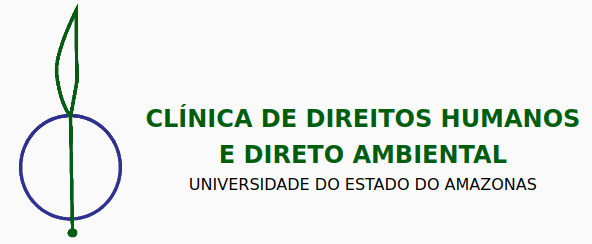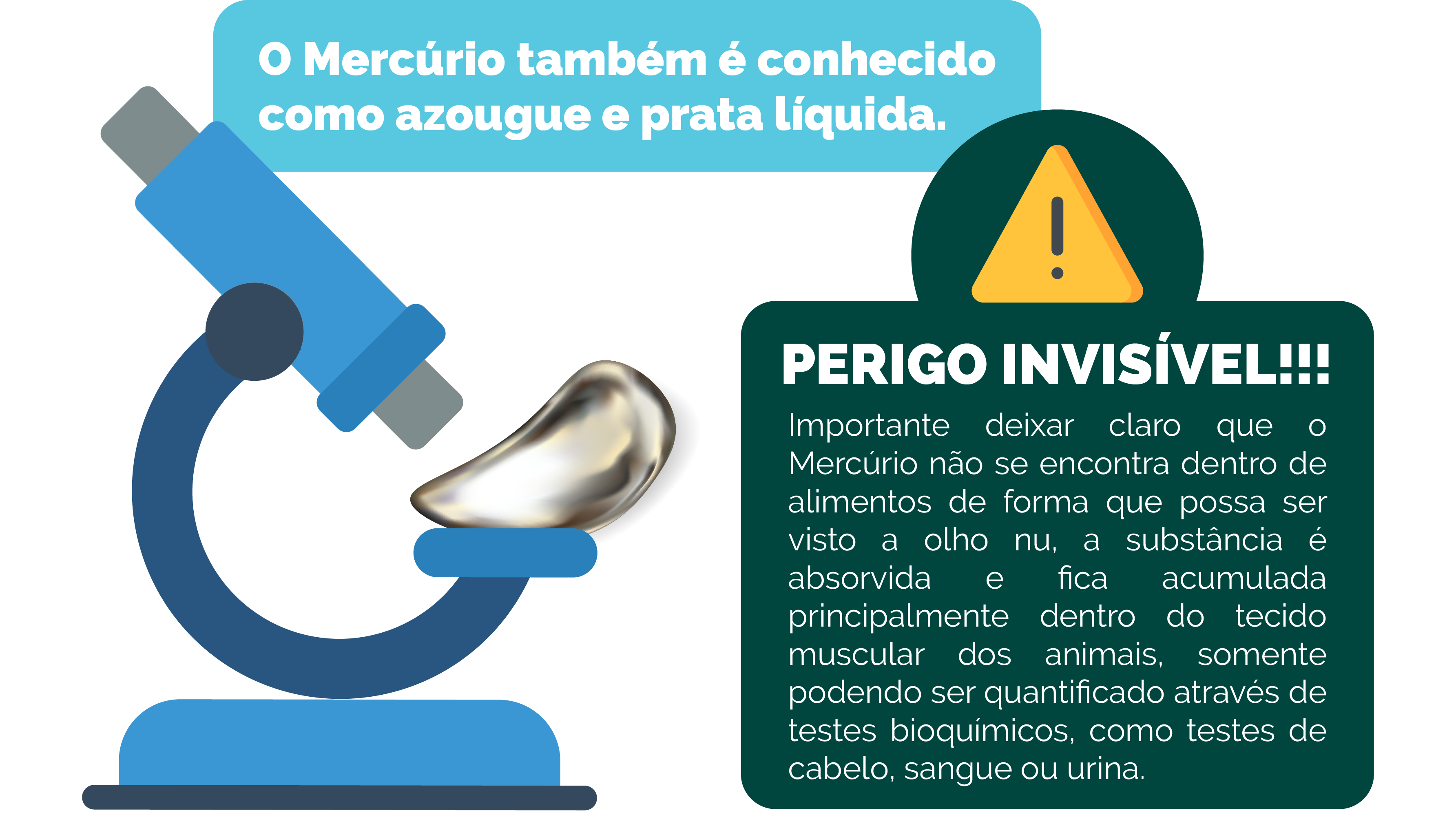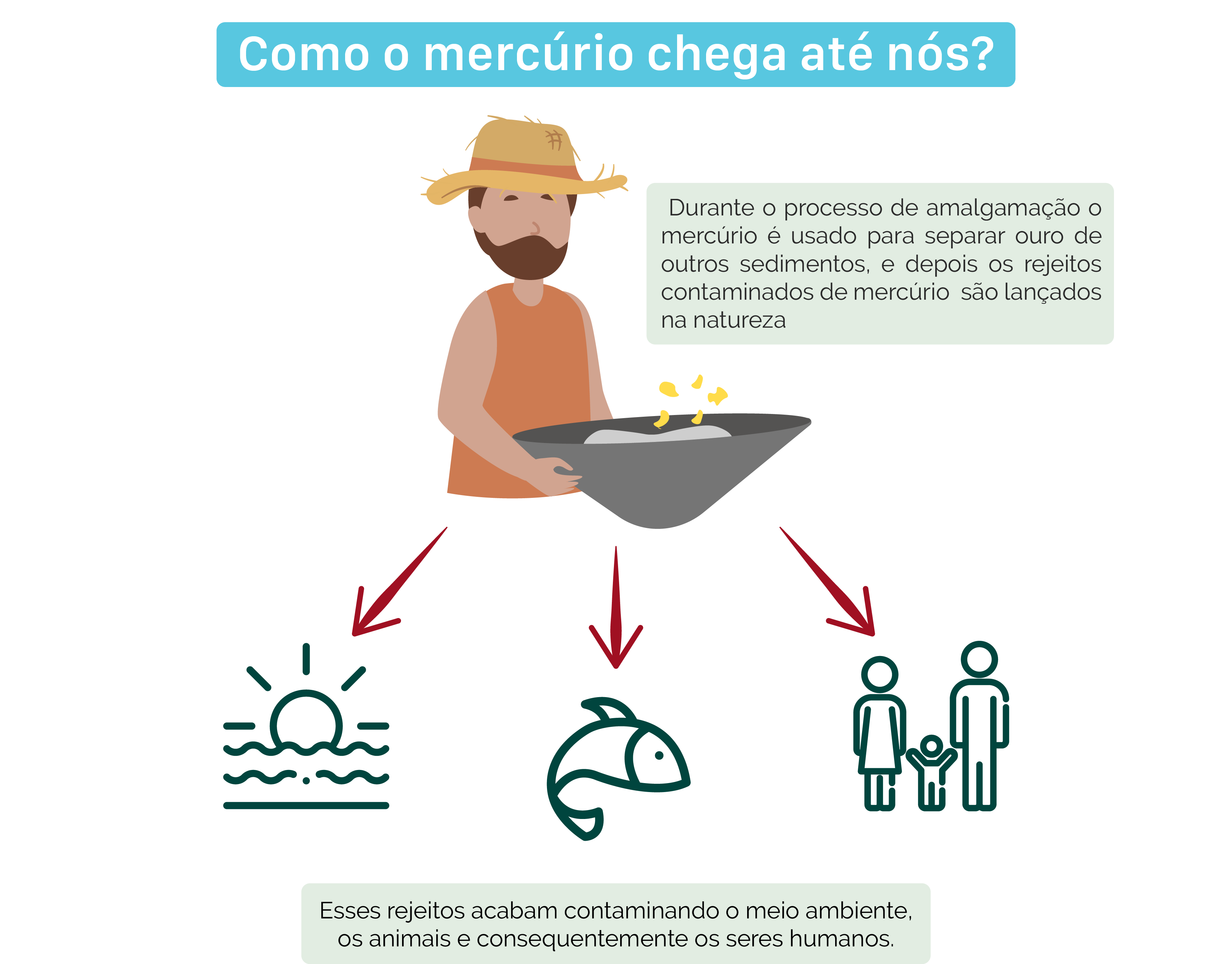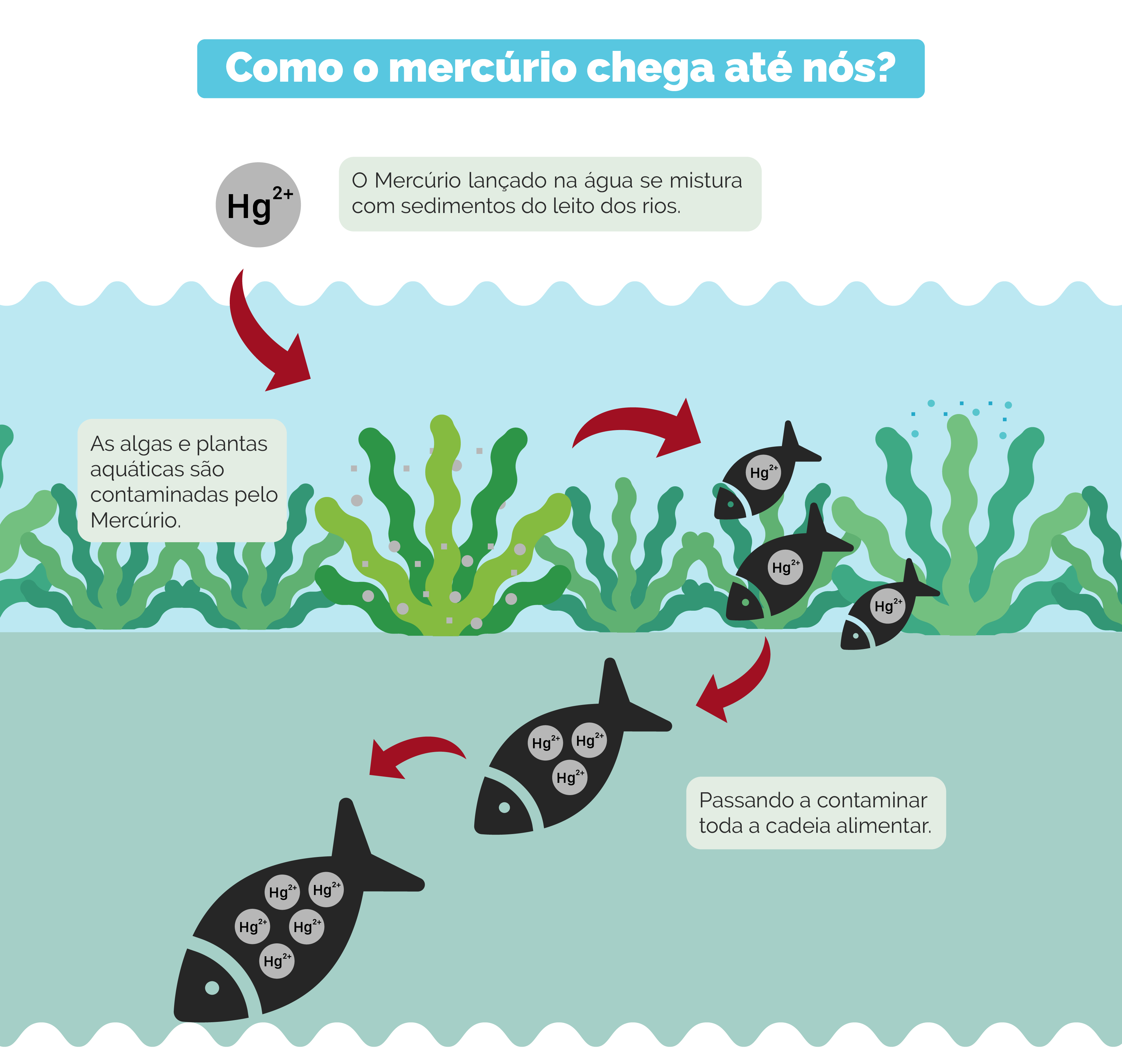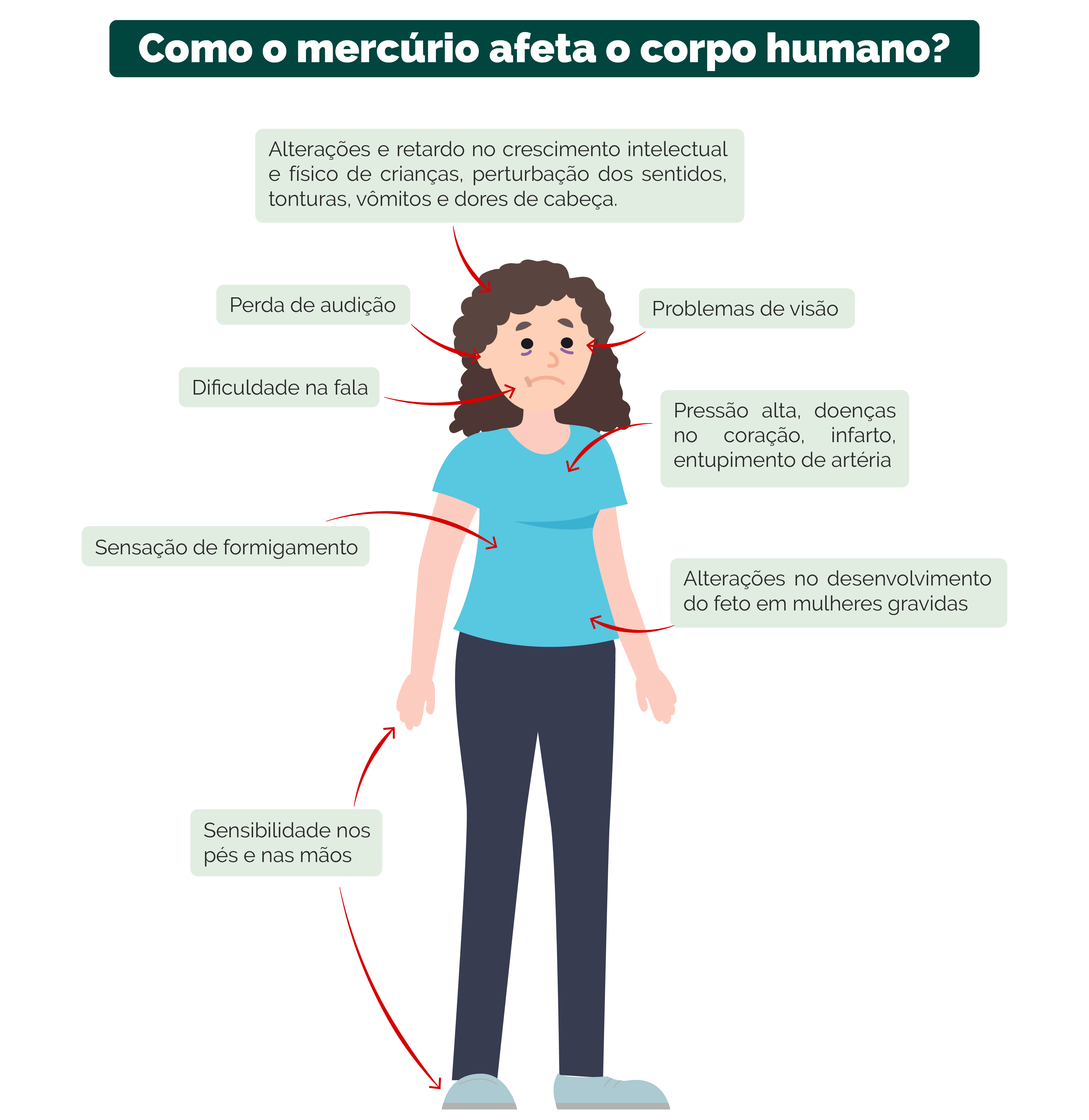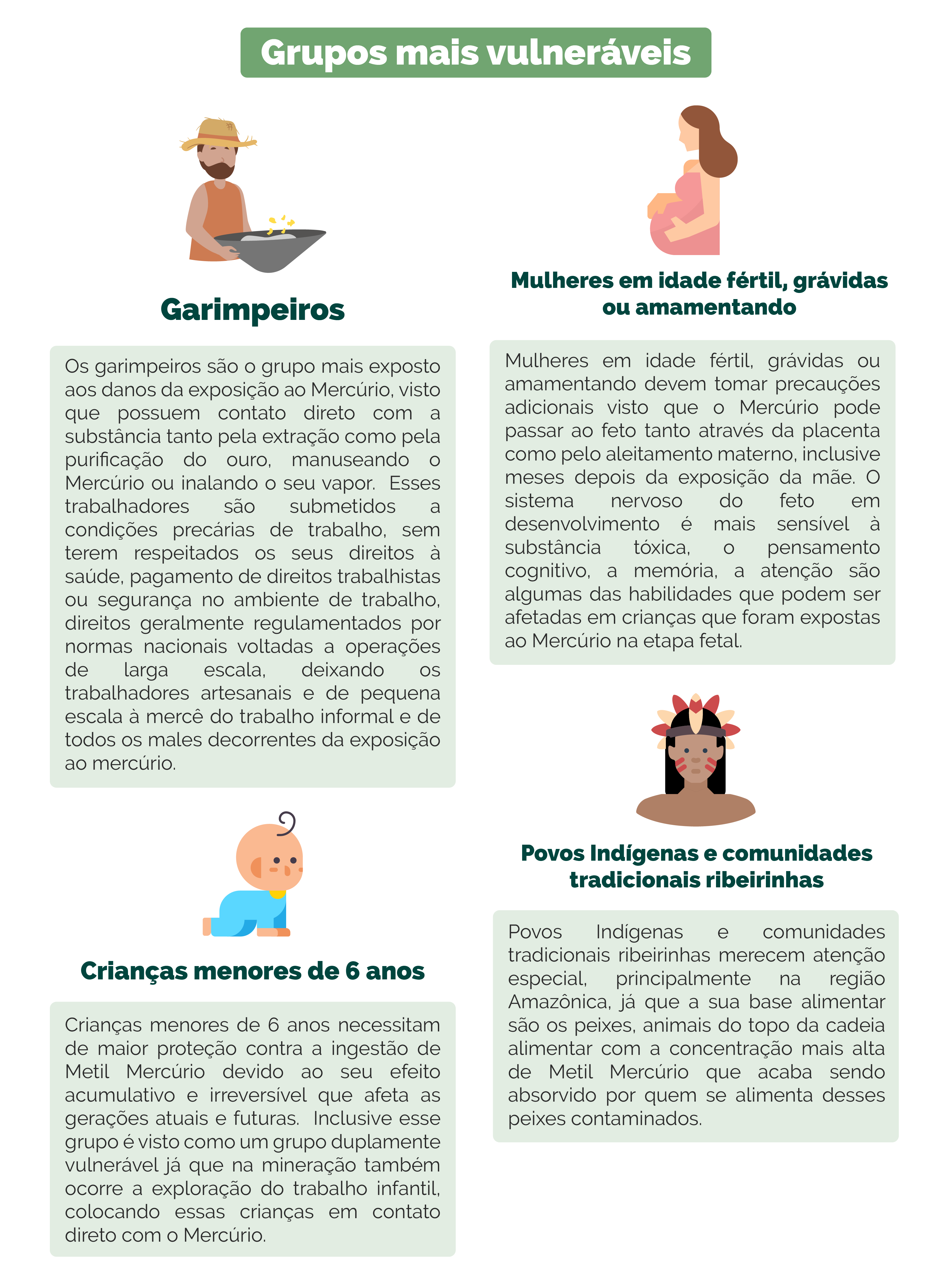
The harmful effects of mercury on human health and nature translate into a series of violations of an interconnected bundle of human rights, such as the right to life, to a healthy environment, to water and sanitation, adequate food, housing, health, leisure, culture, and work, all of which are widely recognized in the normative framework of international law of Human Rights.
Just as human rights are indivisible and interdependent, violations of human rights are too. Human exposure and environmental degradation caused by the release of mercury in the soil, water and air are phenomena capable of generating human rights violations in multiple dimensions of rights simultaneously. Civil, political, economic, social, cultural and environmental rights, which are the best-known categories of human rights, are affected in individually or collectively due to the harmful effects of mercury on humans and nature.
Mercury causes irreparable harm to humans and the environment as a whole. but there are especially exposed vulnerable groups such as indigenous peoples and riverside communities,, miners, pregnant women or women of childbearing age and children. In addition, the use of mercury is capable of of causing irreparable damage to future generations not only for the damage they can cause to the fetus, but also because of the difficult repair of the degraded environment.
This section seeks to make an analogy with the National Inventory of Mercury Emissions and Sources that collects chemical and environmental data on the release of mercury into the environment, collecting information on human rights violations caused by mercury contamination of soil, air and water on human health and the environment in its multiple and interconnected dimensions.
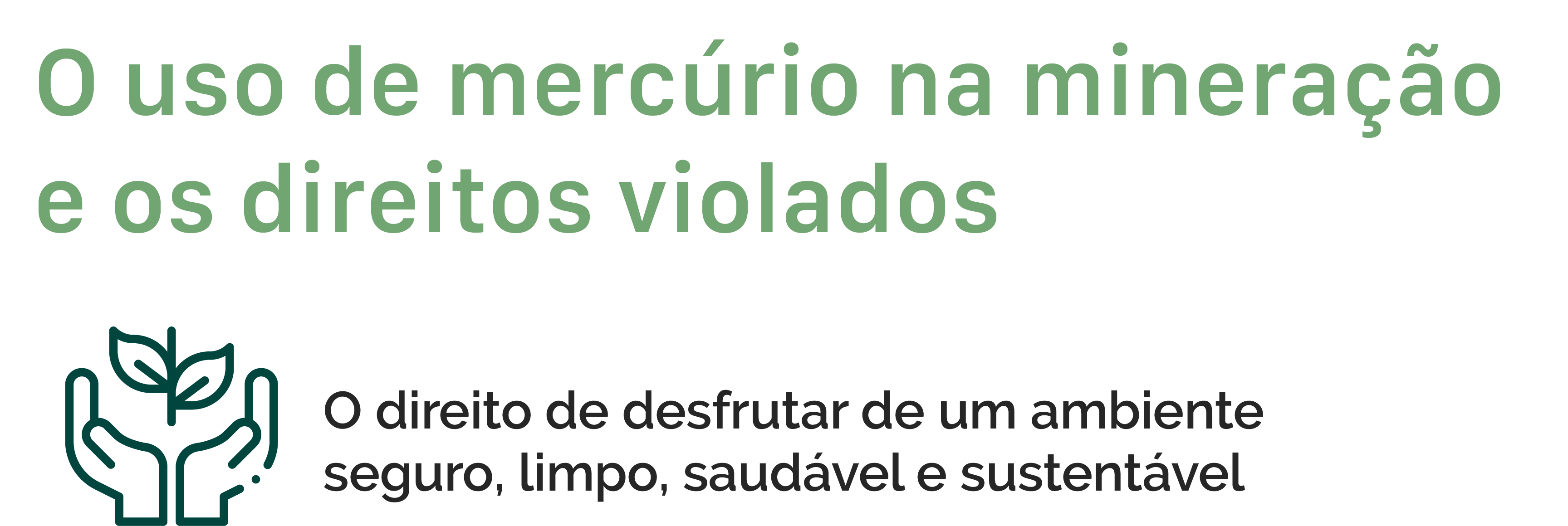
Everyone has the right to live in a non-toxic environment. The use of mercury in mining destroys the environment around the mining site, contaminating water, air and soil. The communities to around mining sites cannot enjoy their right to a healthy environment, toxic and sustainable.

The use of mercury in mining causes adverse health effects, especially for vulnerable groups and marginalized people, such as indigenous peoples, riverside communities, pregnant or elderly women fertile and children. Human exposure to mercury causes several health problems, such as, changes in childrens intellectual and physical growth, high blood pressure, heart disease and infarction, changes in the fetus and babies through the placenta and breastfeeding, speech difficulties, tingling sensation, vision problems, hearing loss, disturbance of the senses, tenderness in the feet and hands, dizziness and headaches.
The right to health requires non-discriminatory treatment, especially with regard to access of the most vulnerable and marginalized populations in remote regions of the Amazon to assistance doctor. It also requires the establishment of health education programs. and the environment and the monitoring of the areas most affected by mercury contamination for the measurement of contamination levels in water, fish and people.

States have an obligation to ensure safe drinking water and food for their citizens. THE right to health is a right that includes not only timely and appropriate health care, but also the determinants of health, such as access to safe water and basic sanitation, and provision of nutritious, adequate and safe food. Mercury contaminates water and fish of the Amazon basin.

The use of mercury contaminates the basic food of the population when it is disposed of and handled in inappropriate way. In the Amazon region, the right to healthy food is undeniably violated as that fish, which is the main source of protein for riverside communities and traditional peoples ends up contaminated.
This contamination process happens when mercury is dumped in water and mixes with river bed sediments, contaminating then algae and plants, and consequently the entire chain to feed. Thus, mercury travels through the food chain through the fish that feed on these algae and fish that feed on fish that feed on these algae. The mercury then passes to be absorbed by the human body and accumulate every time contaminated fish is eaten. THE consumption of these contaminated fish exposes human health to serious risks, which were previously mentioned in the item on the violation of the right to health.
In addition, it is the obligation of the States to seek solutions and alternatives to the use of mercury and thus avoid that primary sources of food for the population are contaminated, making them unsuitable for the consumption, preventing everyones right to be free from hunger from being respected.

Local communities have the right to development. The right to development is a right individual and collective. It belongs to all individuals and to all peoples. The right to “development is an inalienable human right by virtue of which every human person and all peoples have the right to participate in, contribute to and enjoy economic, social, cultural and political, in which all human rights and fundamental freedoms can be fully realized (Article 1 Declaration on the Right to Development). The right to development must also be carried out in such a way as to equitably meet the needs environmental and developmental needs of present and future generations (Principle 3, Rio Declaration on Environment and Development; Paragraph 11, Vienna Declaration and Program of Action). economic growth, such as through the use of mercury in mining, without adequate measures to promoting inclusive, equitable, participatory and environmentally balanced development is unsustainable.

Indigenous peoples have recognized their rights over their traditional territories and to have reparations for lands that were taken and damaged without their free, prior and informed. The indigenous communities of the Amazon Basin did not consent to the illegal invasion of garimpeiros in their territories and is fighting against the destruction caused by mining. The use of mercury in artisanal or small-scale mining damages and pollutes indigenous lands without reparations to affected communities. Mining practices in the Amazon violate peoples rights indigenous to the territory.

Indigenous peoples have the right to protection of the relationship between their cultural and spiritual values and their territories. Indigenous peoples have the right to protect their sacred lands and to conserve medicinal plants, animals and minerals. Artisanal and small-scale illegal gold mining is invading indigenous territories in the Amazon Basin. When mercury is used in mining, it destroys the surrounding ecosystem. Mercury pollutes the soil and water near the sites of mining, which contaminates the plants. Contamination of sacred lands for communities indigenous peoples and medicinal and traditional plants used by indigenous communities violates the cultural and spiritual rights of indigenous peoples.

The right to adequate housing, established in General Comment No. 4 of the International Covenant of Economic, Social and Cultural Rights which states that all persons enjoy protection from forced evictions and ensuring a decent housing environment, however, some communities Indigenous and riverside communities constantly suffer from the construction of gold mines close to their places of home.
Open mines without any kind of environmental concern cause a significant contamination of the soil, not only leaving it infertile but also infecting the local flora and fauna and changing its geological structure. In this sense, nearby communities are directly affected, not only by the damage to the right to adequate housing, but also with regard to water, food and health before treaties.
According to ILO Convention 169, the Brazilian State has the responsibility to impose criminal sanctions against any unauthorized intrusion into indigenous lands, so that the right to housing is fully respected according to the cosmovision of these peoples.

The worker has the right to exercise his profession in a safe place, which guarantees his protection, but the use of mercury in mining and other processes prevents this right from being respected.
Mercury is used in the separation of fine gold particles through amalgamation and subsequent gravimetric separation. The separated amalgam is burned, usually in the open, releasing large amounts of mercury into the atmosphere, in this procedure it is common for workers to inhale the substance, which causes serious damage to the health of the individual. During the process, part of the mercury is lost in metallic form in rivers and soils, and another, in the form of contaminated waste, is left in the open at most mining sites. Furthermore, in the purification of gold, it is sublimated at high temperatures which results in serious contamination of the working environment and the atmosphere where this operation is carried out, providing an easy contamination of the workers and the population that lives around. LACERDA, L.D. Mercury contamination in Brazil: industrial sources vs. Gold mining. Dept. Geochemistry – Fluminense Federal University – 24020-007 – Niterói – RJ. 1996, 197.
Convention 170 of the International Labor Organization (ILO), known as the Convention on Chemical Products, determines that countries must indicate the dangers of using products chemicals in order to guarantee workers the right to information about the products they use, measure not only to protect workers against the harmful effects of chemical items, but also to protect society and the environment.
It is up to the States to develop bodies for the promotion and prevention of health and health for workers, that aim not only to guarantee their rights, but also to identify early the consequences of exposure to chemical products, precisely to Mercury, which is considered one of the more toxic metals released into the environment by human action. It is a state obligation to monitor environmental laws and licenses that control the use of this substance, in addition to the implementation of alternatives to the use of mercury and government actions, practices that benefit the economy, the ecosystem, workers and society as a whole.

As we have seen, all the rights listed in the Inventory above are human rights protected in treaties. Treaties are legal obligations assumed by States that undertake internationally in protecting the rights of all people living in this country. In Brazil, in addition of an international commitment, the treaties, after being approved by the National Congress and ratified by the Presidency of the Republic, become part of the set of legal norms national laws, with a position superior to that of the laws or even with a position equal to that of an amendment constitutional.
Thus, as it is a legal obligation, when a State violates a human right contained in a treaty, can be held internationally responsible, through the activation of the systems international protection of human rights.
If the treaty is part of the United Nations system, the interested party may apply to one of the bodies created in each human rights treaty whose information can be accessed by clicking on here. If the violated right is contained in the American Convention on Human Rights, the interested party may petition the Inter-American Commission on Human Rights whose information is available here.
